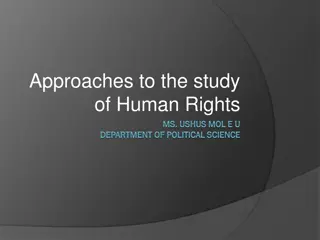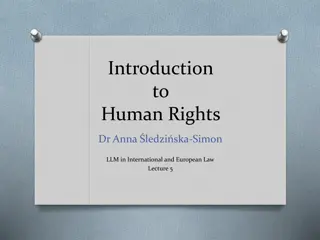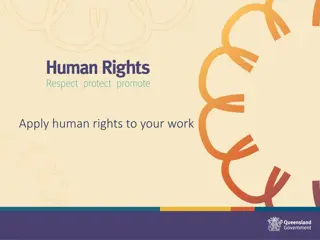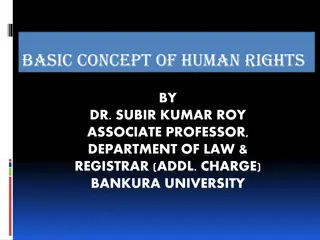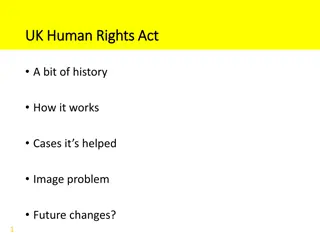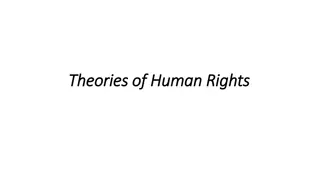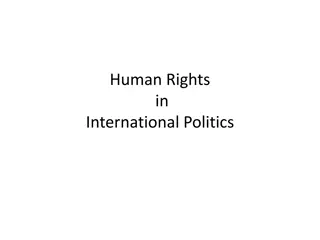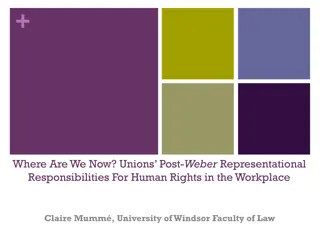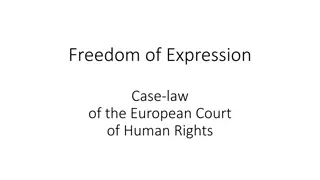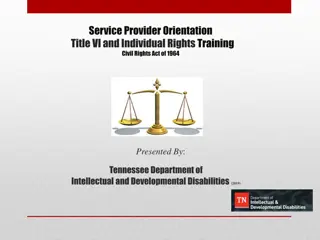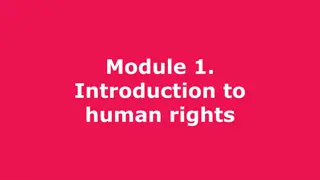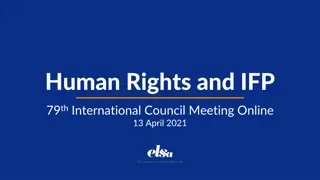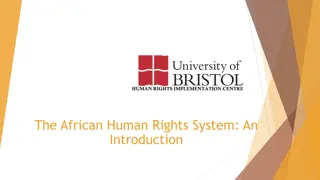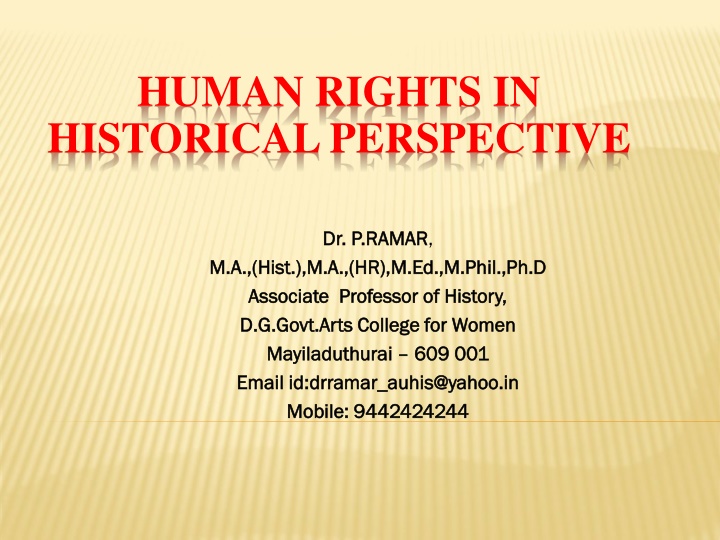
Human Rights in Historical Perspective and Natural Law
Human rights, rooted in natural law, have historical underpinnings dating back to John Locke's concept of natural rights. This perspective highlights the inalienable rights of individuals, the role of the state as a guarantor, and the distinction between positive and negative human rights.
Download Presentation

Please find below an Image/Link to download the presentation.
The content on the website is provided AS IS for your information and personal use only. It may not be sold, licensed, or shared on other websites without obtaining consent from the author. If you encounter any issues during the download, it is possible that the publisher has removed the file from their server.
You are allowed to download the files provided on this website for personal or commercial use, subject to the condition that they are used lawfully. All files are the property of their respective owners.
The content on the website is provided AS IS for your information and personal use only. It may not be sold, licensed, or shared on other websites without obtaining consent from the author.
E N D
Presentation Transcript
HUMAN RIGHTS IN HISTORICAL PERSPECTIVE Dr. P.RAMAR Dr. P.RAMAR, M.A.,(Hist.),M.A.,(HR), M.A.,(Hist.),M.A.,(HR),M.Ed.,M.Phil.,Ph.D Associate Professor of History, Associate Professor of History, D.G.Govt.Arts D.G.Govt.Arts College for Women College for Women Mayiladuthurai Mayiladuthurai 609 001 Email Email id:drramar_auhis@yahoo.in id:drramar_auhis@yahoo.in Mobile: 9442424244 Mobile: 9442424244 M.Ed.,M.Phil.,Ph.D 609 001
HUMAN RIGHTS AS NATURAL RIGHTS HR can be located in the notion of natural rights that was propounded in the 17th century by John Locke, who urged that certain rights are natural to individuals as human beings, having existed even in the state of nature before the development of societies and emergence of the state.
Natural law is based on that nature endows man with a perfect sense of justice. Therefore it is considered higher than positive law. Since natural law is derived from man s essential nature it provides the basis for the belief that all human beings are equal and have certain rights
Contemporary assumptions that underline human rights discourse such as dignity of human being , inalienable rights of human being and universality of human rights have their roots in natural rights. Natural law by its vagueness allowed slavery, poverty, denying the rights of women but continued to provide the basis for demanding the life and equality human beings.
The State is merely a guarantor of rights it is not the fundamental source of these rights (the rights inhere in individuals) and it cannot take them away Simultaneously the inalienable nature of these rights makes it impossible for a person or an institution to waive them. This means they could not be legislated against
POSITIVE AND NEGATIVE HUMAN RIGHTS Positive HR s require the State to take active steps towards their realization (the right to food, adequate housing) Negative human rights refer to freedoms that the State must not encroach upon (freedom from torture or the right not to be detained without trial)
THREE GENERATION OF RIGHTS First Generation Rights Political and Civil Rights Second Generation Rights Social, Economic and Cultural rights Third Generation Rights Emerging sectoral rights such as women, children, dalits, refugees, migrants etc.
THE NEED FOR HUMAN RIGHTS Justice Bhagwati s observation in the Maneka Gandhi s case Jack Donnelly s concept of Modern State Shifting Majority in a Parliamentary Democracy Certain Rights are considered necessary all times
HR does challenge authoritarian traditions within communities HR is incompatible with some traditional practices such as child marriage, child workers, forced labour, religious dissenters and social ostracism
THE GROWTH OF HUMAN RIGHTS AS AN IDEOLOGY IN THE WORLD HISTORY The Magna Carta 1215 The Bill of Rights 1689 The Declaration of Independence 1776 The Declaration of the Rights of Man and of the Citizen 1789 The Bill of Rights 1791 USA The ILO was estd in 1919 sought to promote social justice as a prerequisite for Universal and lasting peace and laid down basic humane and just conditions of work
Second World War Nuremberg Trials Crimes against humanity Liberation wars and Decolonization Process in Latin America, Asia and Africa Drafting of the Modern Constitutions UDHR- 1948 The militant Feminist movement in the 1960 s and 70 s
DEVELOPMENT OF HR AS AN IDEOLOGY IN INDIA The first demand for fundamental rights appeared in the Constitution of India Bill, 1895 This bill guaranteed freedom of expression, inviolability of one s house, right to equality before law, right to property, right to personal liberty and right to free education
Congress Resolutions between 1917 and 1919 demanded for civil rights and equality of status with English. One resolution even mentioned, the British Parliament to pass a statute guaranteeing The civil rights of His Majesty s Indian Subjects .
The provisions establishing equality before law, a free press, free speech etc. With Wilson s 14 points the INC demanded the application of right to self-determination principle to India. proposed statute would embody
Another important landmark was Mrs. Besant s Commonwealth of India Bill of 1925 . It contained a list of seven fundamental rights. INC in its 43rd session at Madras to work on the Nehru Report. Fundamental Rights was incorporated in the Nehru Report
The Karachi Resolution adopted by the Congress session in 1931 observed in order to end the exploitation of masses, political freedom must include the real economic freedom of starving millions The three round table conferences time and again reiterated the need for incorporating Fundamental Rights.
The Sapru Committee Report decided by All Parties Conference in 1944-45/ enumerated the basic rights such as communal harmony, political and civil rights, equality of liberty and security in the enjoyment of the freedom of religion, and worship
The Cabinet Mission in 1946 recognized the need for Fundamental rights. The Constituent Assembly on 24th January 1947 voted to form the Advisory Committee. The FR s sub-committee met for the first time on 27th Feb 1947. The Challenge faced by the committee was the balancing of individual liberty vis- -vis social control.
IMPORTANT CHARACTERISTICS OF HUMAN RIGHTS ARE THE FOLLOWING They are internationally guaranteed They are legally protected They focus on the dignity of the human being They protect individuals and groups They oblige States and State actors They cannot be waived/taken away They are equal and interdependent They are Universal
SOME OF THESE TREATIES COVER WHOLE SETS OF RIGHTS SUCH AS The International Covenant on Civil and Political Rights and The International Covenant on Economic, Social and Cultural rights
OTHER TREATIES FOCUS ON PARTICULAR TYPE OF VIOLATIONS The Convention on the prevention and punishment of the crime of Genocide The International Convention on the Elimination of All forms of Racial Discrimination and The Convention against Torture and other cruel, inhuman or degrading Treatment or punishment
OTHER TREATIES FOCUS ON PARTICULAR GROUPS TO BE PROTECTED, SUCH AS The Convention of the Rights of the Child The Convention on the Elimination of All forms of Discrimination against women The International Convention on the Protection of the Rights of all Migrant Workers and Members of their Families and The Convention (and Protocol) relating to the Status of Refugees
ANOTHER TYPE OF TREATY FOCUSES ON PARTICULAR SITUATIONS SUCH AS ARMED CONFLICT INCLUDING The first Geneva Conventions of 1949 and The Two Protocols of 1977 additional to those Conventions
INTERNATIONAL CRIMINAL COURT Genocide and crimes against humanity in Rwanda and the former Yugoslavia, ad hoc tribunals were estd by the UN Security Council to bring to justice persons responsible for serious abuses in those countries.
With the adoption in Rome on 17th July 1998, of the Statute of the International Criminal Court, laying the foundation for a permanent International tribunal to give effect to the half- century dream
BE HUMAN BE HUMAN THANK YOU THANK YOU

